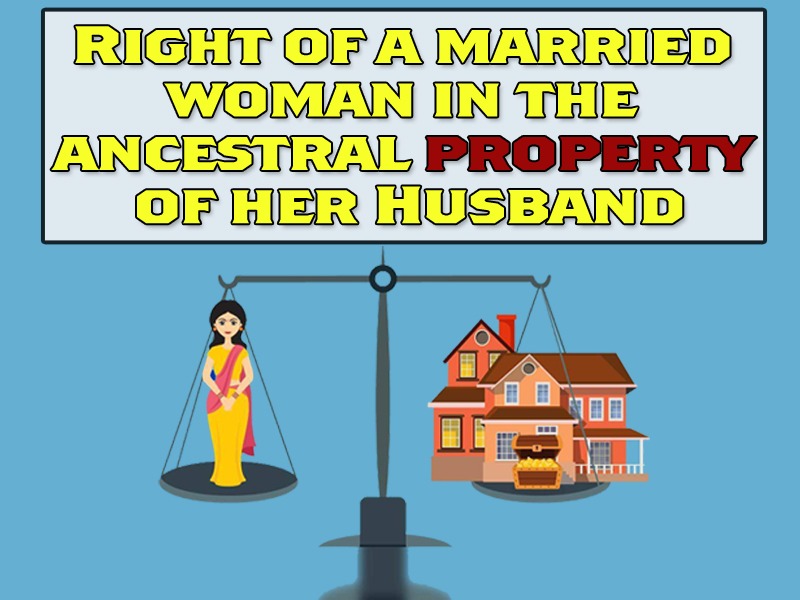After 1956 the laws governing succession in Hindu Law were codified, granting women the right to property by recognizing their right to inheritance in a joint Hindu family and almost 50 after the inception of the Succession Act, in 2005 it was amended, to provide for women right in their ancestral properties, by including daughters in the definition of the coparceners. However, even now mothers, wife and daughter in laws, despite being members of the joint family don’t have any such entitlement.
Can wife claim husband’s ancestral property in India?
Wife’s claim in Ancestral property A wife does not have any right to her husband’s Ancestral Property. Only coparceners of Hindu joint family (Mitakshra) are entitled to inherit ancestral property, and since the wife is not a coparcener in her husband’s joint family, she will not be entitled to the property.
However, when the ancestral property is divided and her husband receives his share from the total, which he can hold as his separate property. The wife will have a claim over her husband’s separate property if the husband dies interstate since she is a class 1 heir in accordance with section 8 of the Hindu succession act. If the husband leaves behind a will, then his property shall be divided in accordance with the will.
Wife’s claim in the joint family Property
In case of a joint family partition between her husband and children, the wife has a claim to the property, equal to the share of her children, this position is based on classic Hindu law (Gurupad Khandappa Magdum v. Hirabai Khandappa Magdum). This property can be held by the wife individually from the husband, as her separate property. However, the wife does not have a right to demand a partition of the joint family property since she is not a coparcener in her husband’s joint family.
Wife’s claim in Husband’s Self Acquired property
The wife does not have any claim to her husband’s self-Acquired property unless she inherits it from her husband after his death, however, she is only entitled to the property if the husband died interstate since she is a class 1 hire in accordance with section 8 of the Hindu succession act. If the husband leaves behind a will, then his property shall be divided in accordance with the will.
Maintenance Right
A Hindu wife and widows have an absolute right to be maintained for their life out of their husbands share in the joint family property under section 18 of the Hindu Adoption and Maintenance Act, 1956.
Section 18(2) of the HAMA provided for situations under which the wife may live separately and claim Maintenance. These include-
- Desertion
- Cruelty
- Leprosy
- Another living wife
- Keeps a concubine
- Conversion
- Any other justifiable reason
However, in accordance with section 18(3) of HAMA, a Hindu wife shall not be entitled to separate residence and maintenance if she is unchaste or ceases to be a Hindu. Section 125 of the code of Criminal Procedure also provides for a wife to seek support from her husband in cases where she has been divorced by, or has obtained a divorce from her husband and has not remarried. The relief under this section is based on whether the husband is capable of earning rather than if he has financial resources.
However, the claim under this section cannot be maintained if the wife is living in adultery, she refuses to live with her husband without sufficient reason or if the married couple is living separately by mutual consent
Section 19 of the HAMA, 1956 also provides for daughter in law’s claim to maintenance from her father-in-law, if she is unable to maintain herself from her own earrings or property, and where she does not have any property, she is unable to obtain maintenance from her husband, parents or children. Wife shall not be entitled to maintenance under this section if the father-in-law does not have a coparcenary property from which she has not already obtained a share or if she has remarried
A legally married wife also has a right to reside in her matrimonial house irrespective of whether she has title or right to the house or not, in accordance with section 17, Domestic Violence Act.
The High court also through its judgment in Varinder Kaur v. Jitender Kumar, 2016 has further clarified the scope of maintenance and held that ‘During subsistence of marriage, maintenance of a married wife is a personal obligation on the part of husband. Such an obligation can be met from the properties of the husband out of joint properties. The properties shown exclusively in the name of parents cannot be subject matter of any attachment or enforcement of any right of maintenance.’
The Apex court in the case of Vaddeboyina Tulasamma v. Vaddeboyina Shesha Reddi, has also highlighted Hindu wife’s right to maintenance as a tangible right against property which flows from the spiritual relationship between the husband and wife while holding that Section 14(1) of the Hindu Succession Act, 1956 must be liberally construed in favor of the females so as to advance the object of the Act. This section makes female Hindu a full owner of a property, instead of a limited owner.

